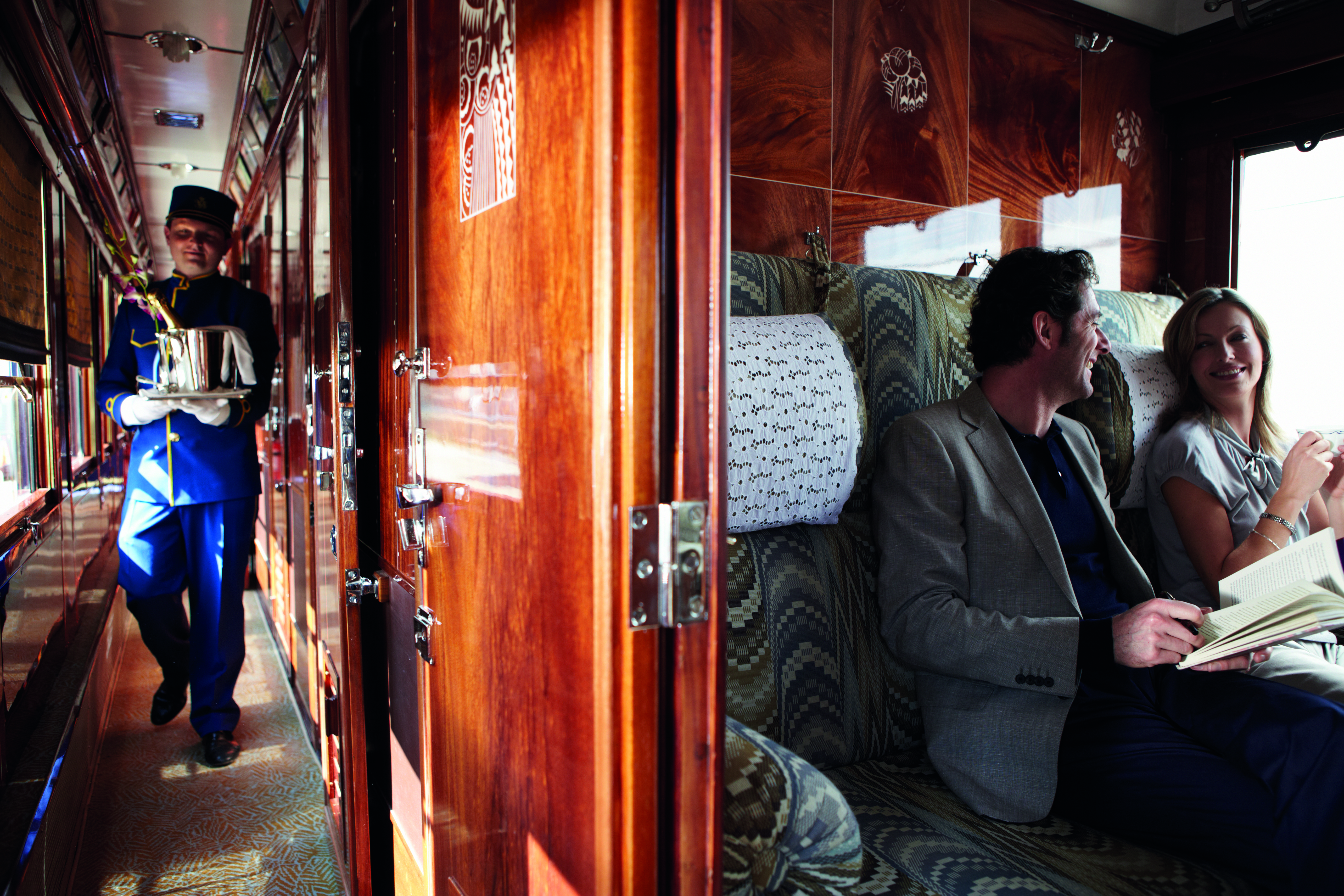A hamarosan bemutatásra kerülő új "Gyilkosság az Orient Expresszen" című film kapcsán nézzünk meg néhány érdekességet a világ egyik leghíresebb vonatáról!
The Orient Express: the King of Trains and the Train of Kings
When you think of the Orient Express, spies, murder, scenery and a sense of adventure to the East spring to mind immediately. This all has to do with its fascinating history, which all began with the idea of an entrepreneurial businessman named George Nagelmackers. Once, when visiting America in the 1860s he discovered the extensive use of long distance trains employing sleeping cars allowing overnight travel. In the day the beds were converted into seats and a restaurant car provided food.
Europe at the time had nothing like this advancement, long distance travel took a long time as sleeper cars had not been introduced, and then passengers bore the discomfort of seats and the lack of food. George Nagelmackers set about realizing his vision of long distance luxury train travel, tappinginto the zeitgeist at the time for a fascination with the Turkish culture known as Orientalism.
His new trains gave those wealthy enough the chance to see for themselves what they had hitherto only read about and to do so in style. He founded La Compagnie Internationale des Wagons-Lits (The International Sleeping Car Company) in 1876. Originally called the Train Delux, by 1891 it was popularly called the Orient Express.
The first Orient Express ran on the 4th October 1883 from Paris to Istanbul via Munich and Vienna. Tracks lead as far as Giurgiu in Romania, passengers then took a ferry across the Black Sea to Istanbul. By 1885 one was able to get all the way to Istanbul by rail.
A passenger embarking on their journey at Istanbul’s station would have been met by the sight of four blue and gold sleeping cars waiting at the platform. In the day, the porter staff converted the beds of the sleeping cars into seats for the same passengers. The four cars usually had 16 and 14 beds each and passengers would share compartments with another person.
There was also a baggage van, where porters would load on the suitcases. The eyes would then meet a restaurant car literally fit for the Kings of Europe who travelled on it: “Its interior contained Lalique chandeliers, a piano and the finest crockery and cutlery. “
The passengers ate like kings as well. On its “maiden journey the menu consisted of no less than seven courses, oysters and turbot in green sauce included, not to mention fine wines and champagne.”
The Kings’ historical connection with the Orient Express has been a mixture of the exciting and the bizarre. King Ferdinand of Bulgaria insisted on driving the engine through his own country, and once allowed, drove at break-neck speeds. King Leopold II of Belgium decided to take the train in order to carry out a plan to covertly enter a Turkish man’s harem in Istanbul.
An air of mystery and adventure has often shrouded the Orient Express like a fog. The writer E.H. Cookeridge who travelled on the service in the early days says:
“Kings and criminals, millionaires and refugees travelled on it; businessmen did deals while sitting at the train’s luxurious dining tables; diplomats, spies and revolutionaries were also on board.”
Bram Stoker used the Orient Express in Dracula, in 1897. In 1932 Graham Greene wrote his thriller Stamboul Train based on the same service. Robert Baden Powell, the founder of the BoyScout movement was himself a spy in the war and concealed diagrams of German defences in the Dalmatian coast in drawings of butterflies made while travelling on the Orient Express.
But it was an incident in 1929 that caught the imagination of Agatha Christie and inspired her to write the famous 1934 novel Murder on the Orient Express:
It was winter, snow fell heavily on the tracks. 50 miles from Istanbul the train came to a standstill marooning the twenty passengers in their carriages. No word could be sent via telegraph because these had become too snowclad and were, also, down. Trapped, as the snow level rose outside the windows, fuel and warmth fell inside, and so they huddled together to keep warm. For two days, the snowstorm raged, on the third it ceased, by which time it had completely concealed the cars from outside view or chance of rescue. Fighting for survival and armed with pickaxes and shovels they began to dig towards freedom. The engine’s warmth had melted some snow so here they began.
Like miners they dug snow tunnels for two days and after a cave-in and exhaustion they finally made it out to fresh air. However, their ordeal continued after being refused aid by a nearby village. Pooling their wealth the passengers managed to return and purchase supplies for survival, enough to wait for rescue. Rescue came in the form of Turkish soldiers and later a snowplough, but not before the driver had had to shoot a marauding wolf pack. The train finally arrived in Istanbul a week later.
Sadly in 2009 the original Orient Express service was taken off the train time-tables, however a lavish and expensive service the Venice-Simplon Express (VSOE) still runs composed of a collection of restored vintage sleeping cars from the heyday of the 20s and 30s. A ticket will cost you 2000 pounds and you will end up in Venice, but you can still make it to Istanbul by rail and experience some of the nostalgia of its former glory.
by Chris Scully
Vocabulary
|
spy |
kém |
|
murder |
gyilkosság |
|
to spring to mind |
eszébe jut |
|
entrepreneurial |
vállalkozó |
|
extensive use |
kiterjedt használat |
|
sleeping car |
hálókocsi |
|
to convert |
átalakítani |
|
advancement |
fejlődés, előrehaladás |
|
to bear |
elviselni |
|
zeitgeist |
korszellem |
|
wealthy |
gazdag, tehetős |
|
hitherto |
addig |
|
track |
sín |
|
ferry |
komp |
|
to embark |
beszállni |
|
porter |
hordár |
|
compartment |
fülke |
|
baggage van |
poggyászkocsi |
|
interior |
belső |
|
chandelier |
csillár |
|
crockery |
étkészlet |
|
cutlery |
evőeszköz |
|
maiden journey |
első út |
|
oyster |
osztriga |
|
turbot |
rombuszhal |
|
atbreak-neck speed |
nyaktörő sebességgel |
|
covertly |
titokban, rejtve |
|
to shroud |
beburkol |
|
refugee |
menekült |
|
luxurious |
luxus |
|
revolutionary |
forradalmár |
|
to conceal |
elrejteni |
|
defence |
védelem |
|
to maroon |
elvágni a közlekedéstől, ott rekeszteni |
|
telegraph |
távíró, távirat |
|
snowclad |
hóval fedett |
|
fuel |
üzemanyag |
|
to huddle together |
egymáshoz közel húzódni |
|
to cease |
megszűnik, abbamarad |
|
pickaxe |
csákány |
|
shovel |
lapát |
|
to melt |
megolvasztani |
|
miner |
bányász |
|
cave-in |
beomlás |
|
exhaustion |
kimerültség, fáradtság |
|
to pool |
egyberakni, egyesíteni |
|
supply |
(élelmiszer)készlet |
|
survival |
túlélés |
|
snowplough |
hóeke, hókotró |
|
marauding |
portyázó |
|
wolf pack |
farkascsapat |
|
lavish |
pompás, pazar |
|
restored |
helyreállított |
|
vintage |
retró |
|
heyday |
aranykor, fénykor |
|
glory |
dicsőség |





